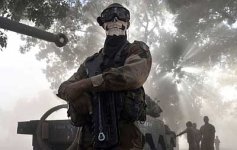Independent
IB Expert
- Messages
- 1,123
- Reaction score
- 55
- Gender
- Male
- Religion
- Other
what many of us are passing by is the FACT that this is an illegitimate government according to UN STANDARDS.
You are missing out the reason for the collapse of the democratic government, which had previously been one of the most successful in Africa for 20 years.
The situation in Mali is a side effect of the fall of Gadaffi. The weaponry and the fighters who are now destroying Mali are partly the remains of Gadaffi’s foreign bodyguard, who fled Libya after his death.
The first stage was a Tuareg revolt. It was this revolt that provoked the military coup, because the army felt the government wasn’t doing enough to help them (Mali is a desperately poor country and the Libyan refugees simply outgunned them).
Now the revolt has been ‘taken over’ by self-proclaimed Islamist fighters and the Tuaregs too have been sidelined. They also seem to have support from rebels driven out of Algeria.
'democratic and multiparty don't seem to appeal to the rats in the pentagon, because they could see the influence of Islam spreading in the region.'
Nonsense – it was the Tuareg revolt that brought down the democratic government, not the west. The Islamists are simply exploiting the chaos and power vacuum.
'it looks to me that they remained "silent" or even complacent during an illegal coup,'
No they did not, which is why the UN opposed the military regime. But they didn’t intervene straight away because for a time it looked as though Mali might be able to look after the situation itself. Also, it was guaranteed that any western assistance would be portrayed as an ‘invasion’ by people such as yourself.
'so again - we see a democratic government overthrown with the help of the u.s and u.n, an illegal military dictatorship installed, and killing of Muslims and islamic leaders before another "election" which will have not moral legitimacy or fair ground.'
Absolute nonsense. Until yesterday this was exclusively a Muslim v Muslim conflict. The weak Malian army is in no position to resist the Libyan refugee fighters so they have called for help. Other African states have promised support, but the situation was so urgent France have acted now.
1.
it wasn't the Islamists who overthrew the government.
It wasn’t the west either - it was a consequence of the Tuareg revolt.
2.
they kept the country in one piece by preventing a splintering off of another section - which the u.s would most likely have taken control of through imf loans (look at previous trends).
A ridiculous statement by any analysis – the country is now split in two by the rebels.
3.
with no organization or legitimacy, the military junta would have lost ground.
Just because one illegal government has seized power (the military) doesn’t make it ok to swap it for another (the Islamists). At least the military are all Malians, which is more than can be said for the Islamists.
4.
Islamists would have had the country in no time if it hadn't been for the selective meddling of the spawn of Satan
The Islamists have seized the less populated desert north. The south would have been harder. Many thousands of victims would have been added to the death toll already recorded.
another thing i noticed is the heavy use of the terms al qaeda "affiliated" and "associated" when nothing else can be found..the only association usually needed are the fact that they are Muslim and ready to fight for their convictions.
Why do you assume this revolt is a good thing just because of the ‘Islamist’ tag? This is not Islam v the West, it’s a moderate Islam v an extreme Islam. The effect on the Mali economy has been catastrophic, never mind the direct loss of life. In addition, the vandalistic destruction of the UNESCO listed tombs in Timbuctoo is a gross cultural crime that deprives Africa of one of its few genuinely iconic historical sights.
How do you make any of this out to be a good thing?



 knows in his knowledge and of the condition of those individuals themselves. But here is a clear situation of kaffir desptic govt. consorting with their western masters to kill Muslims. Most if not all current so called Muslim majority regions are Daar Al Harb!
knows in his knowledge and of the condition of those individuals themselves. But here is a clear situation of kaffir desptic govt. consorting with their western masters to kill Muslims. Most if not all current so called Muslim majority regions are Daar Al Harb!
